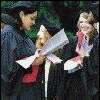 |
|
End of Guomindang Dynasty Expected in Tight Race for Taiwan Presidency
Rev. Michael Stainton, a research associate with the Joint Centre for Asia Pacific Studies (JCAPS) at York University and the University of Toronto, will provide an analysis of the election outcome in a JCAPS-sponsored seminar entitled Why it Matters Who Wins Taiwan's Election, at York University on Monday, March 27, 2:30 p.m.
Stainton, a York PhD candidate, is recognized in both academic and Taiwanese circles as one of Canada's most knowledgeable scholars on Taiwanese domestic politics and society. He was both an organizer and member of the Taiwan Election Canadian Group of Observers in 1992 which included several federal Members of Parliament. Canada's Chinese-language newspapers have been filled with election talk for the past two weeks, and Stainton says many Taiwanese Canadians have flown back to vote and help in the campaign. "Politics in Taiwan is driven by pride in their democratic system, which is driven by Taiwanese nationalism," says Stainton.
The most recent polling in Taiwan shows Chen and his Democratic Progressive Party (DPP) running neck and neck with former Guomindang insider and now independent James (Chu-Yu) Soong. Vice-President Lien Chan of the ruling Guomindang is trailing slightly and has been hurt by some high profile defections. Disillusioned by corruption at the core of the Guomindang, Nobel Prize winner Li Yuan-Tzu, and the founder of ACER Computers Shih Chenjung have publicly declared their support for Chen. Nevertheless, Stainton predicts a win for independent candidate Soong Chu-Yu, partly because of public fears that a win by Chen might provoke Chinese aggression. He believes a slight plurality of the large block of undecided voters, last estimated at 34 per cent, will shift to Soong.
"The irony is that no matter who wins this election, in the end, all three candidates' policies on China-Taiwan relations are ultimately unacceptable to China," says Stainton. He points out that although Soong is depicted as the more pro-reunification candidate, he is one of the architects of Taiwan's democratization and proposes discussing a European Union type of confederacy with China only after a 20-year wait-and-see period.
Stainton has written extensively on Taiwan's political transformation and speaks Mandarin Chinese and a number of Taiwanese dialects. He was a missionary serving the Presbyterian Church in Taiwan from 1980 to 1991, doing rural community development among Taiwan Aboriginal Peoples. During that time he worked with many of the activists who are now leaders and legislators in the opposition DPP. Stainton is now a PhD candidate in Social Anthropology at York. In 1998-99 he spent a year in Taiwan conducting field work, which involved detailed research on three local elections held during that time. His seminar will convene in room 270 York Lanes, York University, Keele Campus, 4700 Keele St.
For further information, please contact:
Rev. Michael Stainton
Bernard Frolic
Susan Bigelow |
|
|
| | Welcome to York University | Latest Release | Release Archives | |
![[to York's Home Page]](../../images/yorklogos.gif)
